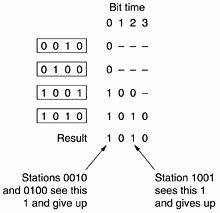Collision-Free Protocols
Collision-Free Protocols
Although collisions do not occur with CSMA/CD once a station has unambiguously captured the channel, they can still occur during the contention period. These collisions adversely affect the system performance, especially when the cable is long and the frames are short. And CSMA/CD is not universally applicable. In this section, we will examine some protocols that resolve the contention for the channel without any collisions at all, not even during the contention period. Most of these are not currently used in major systems, but in a rapidly changing field, having some protocols with excellent properties available for future systems is often a good thing. In the protocols to be described, we assume that there are exactly N stations, each with a unique address from 0 to N - 1 ''wired'' into it. It does not matter that some stations may be inactive part of the time. We also assume that propagation delay is negligible.
A Bit-Map Protocol
In this collision-free protocol, the basic bit-map method, each contention period consists of exactly N slots. If station 0 has a frame to send, it transmits a 1 bit during the zeroth slot. No other station is allowed to transmit during this slot. Regardless of what station 0 does, station 1 gets the opportunity to transmit a 1 during slot 1, but only if it has a frame queued. In general, station j may announce that it has a frame to send by inserting a 1 bit into slot j. After all N slots have passed by, each station has complete knowledge of which stations wish to transmit. At that point, they begin transmitting in numerical order.

Transmission of frames in Bit-Map Protocol
Since everyone agrees on who goes next, there will never be any collisions. After the last ready station has transmitted its frame, an event all stations can easily monitor, another N bit contention period is begun. If a station becomes ready just after its bit slot has passed by, it is out of luck and must remain silent until every station has had a chance and the bit map has come around again. Protocols like this in which the desire to transmit is broadcast before the actual transmission are called reservation protocols.
Binary Countdown
A problem with the basic bit-map protocol is that the overhead is 1 bit per station, so it does not scale well to networks with thousands of stations. We can do better than that by using binary station addresses. A station wanting to use the channel now broadcasts its address as a binary bit string, starting with the high-order bit. All addresses are assumed to be the same length. The bits in each address position from different stations are BOOLEAN ORed together. We will call this protocol binary countdown. It implicitly assumes that the transmission delays are negligible so that all stations see asserted bits essentially instantaneously. To avoid conflicts, an arbitration rule must be applied: as soon as a station sees that a high-order bit position that is 0 in its address has been overwritten with a 1.

Station give ups in Binary Countdown
